

The Impact of Exchange Rates on Japan's Economy. There have been some violent swings between the Japanese yen and other currencies exchange rate in the past 30 years.
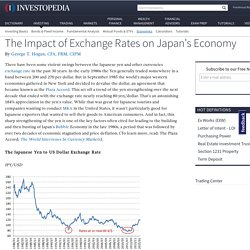
How Petrodollars Affect The U.S. Dollar (petrol) After the collapse of the Bretton Woods gold standard in the early 1970s, the U.S. struck a deal with Saudi Arabia to standardize oil prices in dollar terms.
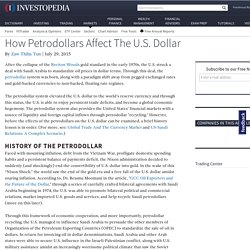
Through this deal, the petrodollar system was born, along with a paradigm shift away from pegged exchanged rates and gold-backed currencies to non-backed, floating rate regimes. The petrodollar system elevated the U.S. dollar to the world's reserve currency and through this status, the U.S. is able to enjoy persistent trade deficits, and become a global economic hegemony. The petrodollar system also provides the United States’ financial markets with a source of liquidity and foreign capital inflows through petrodollar "recycling.
" However, before the effects of the petrodollars on the U.S. dollar can be examined, a brief history lesson is in order. (For more, see: Global Trade And The Currency Market and US-Saudi Relations: A Complex Scenario.) The Insiders Who Fix Rates for Gold, Currencies And Libor. Devaluation Definition. Dollarization Explained. The U.S. Dollar's Unofficial Status as World Currency. When you travel around the world nowadays, it's not uncommon to find that a currency, like the U.S. dollar (USD), has become very engrained in a country's economy.
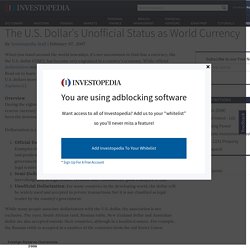
While official dollarization may be well-documented, the murky world of unofficial dollarization is not. Read on to learn more about unofficial dollarization, why it has become so popular and how U.S. dollars move in and out of the United States. (For background reading, see Dollarization Explained.)OverviewDuring the eighteenth and nineteenth centuries, the British pound reigned as the world's reserve currency but in the twentieth century, the U.S. dollar laid claim to this title. It has been the dominant reserve currency since the end of World War II. Dollarization is a generic term that can fall into three categories: How Currency Works (WU) Grexit Definition. DEFINITION of 'Grexit' Grexit, an abbreviation for "Greek exit," refers to Greece's potential withdrawal from the eurozone, after which it would most likely revert to using the drachma, its currency until 2001.
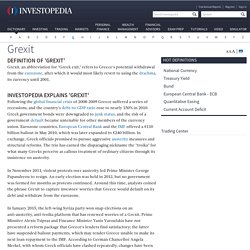
INVESTOPEDIA EXPLAINS 'Grexit' Following the global financial crisis of 2008-2009 Greece suffered a series of recessions, and the country's debt-to-GDP ratio rose to nearly 150% in 2010. Greek government bonds were downgraded to junk status, and the risk of a government default became untenable for other members of the currency union. Eurozone countries, European Central Bank and the IMF offered a €110 billion bailout in May 2010, which was later expanded to €240 billion. In November 2011, violent protests over austerity led Prime Minister George Papandreou to resign.
In January 2015, the left-wing Syriza party won snap elections on an anti-austerity, anti-troika platform that has renewed worries of a Grexit. International Monetary Fund (IMF) Definition. Current Account Deficit Definition. DEFINITION of 'Current Account Deficit' A measurement of a country’s trade in which the value of goods and services it imports exceeds the value of goods and services it exports.
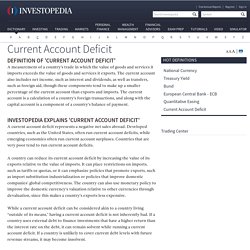
The current account also includes net income, such as interest and dividends, as well as transfers, such as foreign aid, though these components tend to make up a smaller percentage of the current account than exports and imports. Quantitative Easing Definition. DEFINITION of 'Quantitative Easing' An unconventional monetary policy in which a central bank purchases government securities or other securities from the market in order to lower interest rates and increase the money supply.
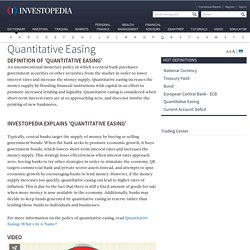
Quantitative easing increases the money supply by flooding financial institutions with capital in an effort to promote increased lending and liquidity. Quantitative easing is considered when short-term interest rates are at or approaching zero, and does not involve the printing of new banknotes. INVESTOPEDIA EXPLAINS 'Quantitative Easing' Typically, central banks target the supply of money by buying or selling government bonds. European Central Bank (ECB) Definition. Treasury Yield Definition. DEFINITION of 'Treasury Yield' The return on investment, expressed as a percentage, on the U.S. government’s debt obligations (bonds, notes and bills).
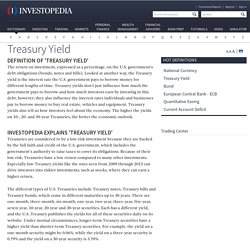
Looked at another way, the Treasury yield is the interest rate the U.S. government pays to borrow money for different lengths of time. Treasury yields don’t just influence how much the government pays to borrow and how much investors earn by investing in this debt, however; they also influence the interest rates individuals and businesses pay to borrow money to buy real estate, vehicles and equipment. Treasury yields also tell us how investors feel about the economy. Currency Exchange: Floating Rate Vs. Fixed Rate. Did you know that the foreign exchange market (also known as FX or forex) is the largest market in the world?

In fact, more than $3 trillion is traded in the currency markets on a daily basis, as of 2009. This article is certainly not a primer for currency trading, but it will help you understand exchange rates and fluctuation. What Is an Exchange Rate? An exchange rate is the rate at which one currency can be exchanged for another. In other words, it is the value of another country's currency compared to that of your own. Fixed Exchange RatesThere are two ways the price of a currency can be determined against another. SEE: What Are Central Banks? If, for example, it is determined that the value of a single unit of local currency is equal to US$3, the central bank will have to ensure that it can supply the market with those dollars.
What Causes A Currency Crisis? Since the early 1990s, there have been many cases of currency investors who have been caught off guard, which lead to runs on currencies and capital flight.
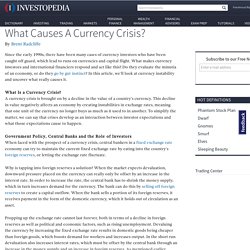
What makes currency investors and international financiers respond and act like this? Do they evaluate the minutia of an economy, or do they go by gut instinct? In this article, we'll look at currency instability and uncover what really causes it.